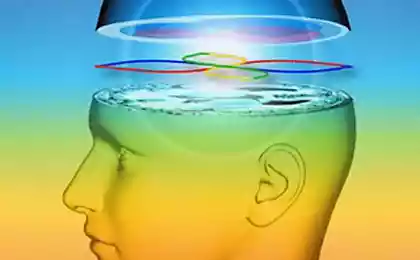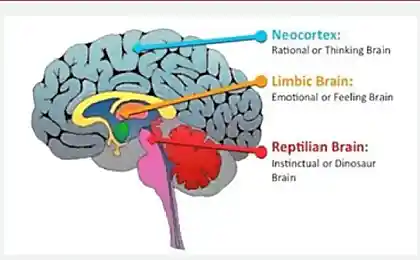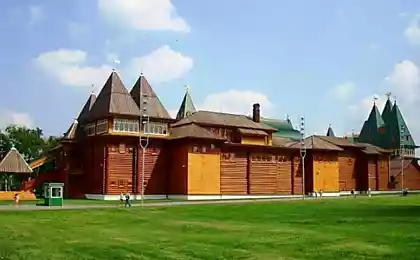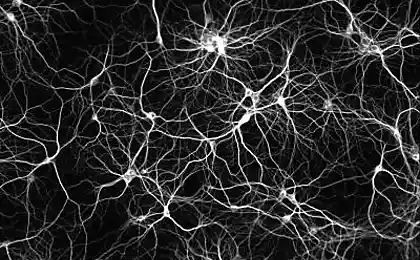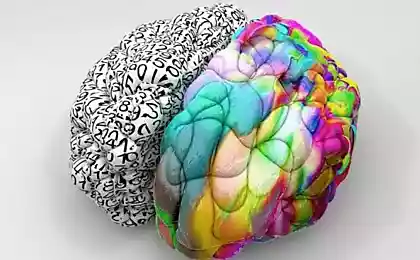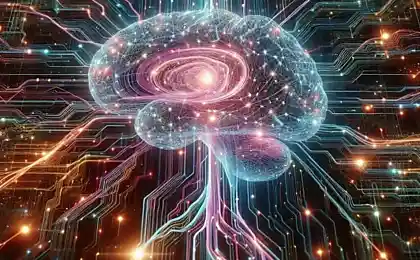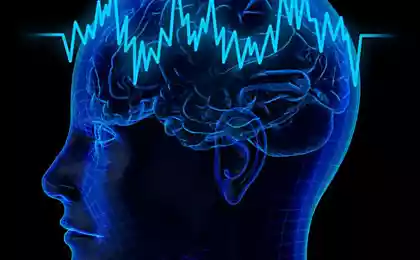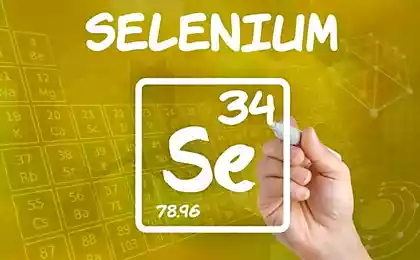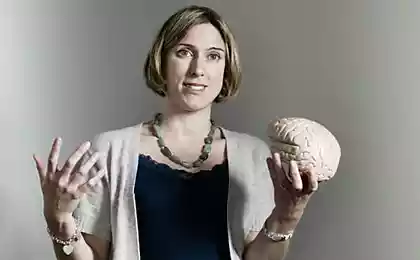772
"The memory Palace": the Technique of brain training
Brain trainingAs you have with memory? If so, like most people, you most likely will need assistance in this area.
Two-time world champion in memorization Alex Mullen and his classmate Katie Chen talk about the technique of memorization called "the memory Palace", also known as method of loci, which will help you to improve short-term memory.
In the method for remembering unfamiliar or new things use the room or place that you know. The reason for its high efficiency lies in the fact that most people have good visual and spatial memory.
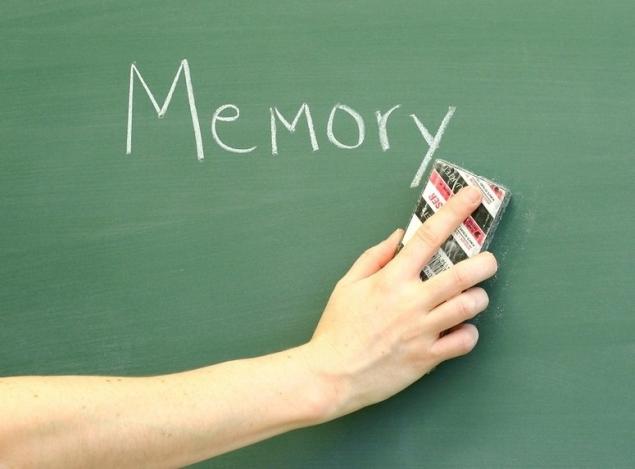
Chen said: "the visualization of the images makes it more memorable and interesting for your brain than, for example, random names or numbers".
As an example, Chen and Mullen explain how to remember a shopping list before going to the grocery store. Most likely, you well aware of your kitchen, therefore, to remember that your list is eggs, in the mind go to the kitchen, look at the fruit basket, for example, and imagine that it should communicate a chicken.
When you're in the store, you can again in the mind to move in space (in your kitchen), remember fruits and funny looking at her eggs. Another example: imagine that all your napkins smeared with toothpaste. Remembering swipe, you automatically remember that you need to buy toothpaste.
You too can become a professional on memorizationAccording to a new study, a professional on memorization anyone can become by training your brain with these techniques. Even those who have never used mnemonic techniques to learning, coped with this task and within six weeks was able to use his brain as recognized in the world of the wizard of remembering.
Studies confirm the words of Chen and Muller — between memory centers in the brain the Champions in the memorization and visual center and the center for spatial thinking has a very strong connection; apparently, this is the key to their impressive art of memory. As noted by CNN:
"[Researcher Boris Nikolai] Conrad explains that the methods of mental training of athletes: visualization of famous places and populating it with imaginary objects, for example, to remember the name Moscow, you can imagine a cow chewing moss (eng. moss – moss cow – cow; moss + cow = Moscow – Moscow – approx.TRANS.)
In fact, you strengthen and expand the relationships between the various centers of the brain. You don't change its structure.
Training that uses repetition, showed only minor advantages in memorizing compared to using the mnemonic technique of "the memory Palace". Brain scans also showed that they do not strengthen communication inside the brain. If you want to try or learn more about the technique of "the memory Palace", visit the website MemoCamp.com.
Among other mnemonic techniques — ways to remember words, information or concepts used:
Here, the principle of"Use it or lose it", and earlier studies show that participation in an inspiring social activities, Hobbies and crafts, such as knitting or quilting, help maintain mental acuity in age and prevent cognitive decline. Journal of psychosocial nursing and mental health services reports:
"Chess and bridge is a recreation that requires working memory and thinking abilities. Older people who play bridge perform better in memory and thinking abilities than those who do not play this game, solving crossword puzzles is also associated with support for thought processes in the elderly".
To useful leisure activities also include:
The researchers say: "Similar results can be an indication that Mozart's music can "activate" the neural system of the brain (system of nerve cells in the brain) associated with attention and cognitive functions."
Moreover, the study shows that odors are especially effective reminder of past experiences, much more effective tips from the other organs of sense, such as signs and sounds.

Payment methods intellectual ToolkitIf you are ready to start learning a foreign language, to playing the piano or knitting, you still have funds to stimulate the growth of new brain cells and neural connections, loading the brain with various games and puzzles. Here are a few resources you can try:
For example, according to the study, people involved in sports, a greater volume of gray matter in the area of the hippocampus, which is important for memory. Physical activity also prevent age-related mental decline, keeping the white and gray matter in the frontal, temporal and parietal parts of the cortex of the brain thus preventing cognitive decline.
One of the mechanisms by which your brain benefits from physical activity isa protein called neurotrophic factor brain (BDNF).Physical exercises stimulate production of a protein called FNDC5 (irisin), which in turn triggers the production of BDNF, which has a significant rejuvenating effect. BDNF preserves existing brain cells and activates brain stem cells that convert into new neurons, effectively stimulating the growth of the brain.
Another involved mechanism is associated with a substance called β-hydroxybutyrate, which is produced by the liver when fat is burned by the body as fuel. The brain can use as feeding and glucose, and fat, but prefers the latter. When during a workout is depleted of carbs, the hippocampus switches to use fat as an energy source, and this switch triggers the production of BDNF and the subsequent improvement of cognitive functions.
When the level of sugar in the blood β-hydroxybutyrate is an alternative source of energy. While β-hydroxybutyrate gastonomia also blocks enzymes that inhibit the production of BDNF. It seems that your body created in such a way that production of BDNF is increased in many different ways, a reaction to a physical load.
Interestingly, research shows that exercising within four hours after learning something new helps to keep in long term memory new material. During physical activity immediately after study a similar effect was found.
The reasons for this four-hour delay to improve memorization is still unclear, but it seems that it is associated with release of catecholamines, such as dopamine and norepinephrine — natural chemical compounds in your body, strengthen memory. One way to increase the level of catecholamines are exercise, and a break before sports, probably also is part of the equation. published
Author: Dr. Joseph Mercola
P. S. And remember, just changing your mind — together we change the world! ©
Source: //russian.mercola.com/sites/articles/archive/2017/04/13/%D1%83%D0%BB%D1%83%D1%87%D1%88%D0%B5%D0%BD%D0%B8%D0%B5-%D0%BF%D0%B0%D0%BC%D1%8F%D1%82%D0%B8-%D1%82%D1%80%D0%B5%D0%BD%D0%B8%D1%80%D0%BE%D0%B2%D0%BA%D0%B0-%D0%BC%D0%BE%D0%B7%D0%B3%D0%B0.aspx
Two-time world champion in memorization Alex Mullen and his classmate Katie Chen talk about the technique of memorization called "the memory Palace", also known as method of loci, which will help you to improve short-term memory.
In the method for remembering unfamiliar or new things use the room or place that you know. The reason for its high efficiency lies in the fact that most people have good visual and spatial memory.

Chen said: "the visualization of the images makes it more memorable and interesting for your brain than, for example, random names or numbers".
As an example, Chen and Mullen explain how to remember a shopping list before going to the grocery store. Most likely, you well aware of your kitchen, therefore, to remember that your list is eggs, in the mind go to the kitchen, look at the fruit basket, for example, and imagine that it should communicate a chicken.
When you're in the store, you can again in the mind to move in space (in your kitchen), remember fruits and funny looking at her eggs. Another example: imagine that all your napkins smeared with toothpaste. Remembering swipe, you automatically remember that you need to buy toothpaste.
You too can become a professional on memorizationAccording to a new study, a professional on memorization anyone can become by training your brain with these techniques. Even those who have never used mnemonic techniques to learning, coped with this task and within six weeks was able to use his brain as recognized in the world of the wizard of remembering.
Studies confirm the words of Chen and Muller — between memory centers in the brain the Champions in the memorization and visual center and the center for spatial thinking has a very strong connection; apparently, this is the key to their impressive art of memory. As noted by CNN:
"[Researcher Boris Nikolai] Conrad explains that the methods of mental training of athletes: visualization of famous places and populating it with imaginary objects, for example, to remember the name Moscow, you can imagine a cow chewing moss (eng. moss – moss cow – cow; moss + cow = Moscow – Moscow – approx.TRANS.)
In fact, you strengthen and expand the relationships between the various centers of the brain. You don't change its structure.
Training that uses repetition, showed only minor advantages in memorizing compared to using the mnemonic technique of "the memory Palace". Brain scans also showed that they do not strengthen communication inside the brain. If you want to try or learn more about the technique of "the memory Palace", visit the website MemoCamp.com.
Among other mnemonic techniques — ways to remember words, information or concepts used:
- acronyms (e.g., SV for remembering words "vintage")
- visualization (imagine the tooth to remember that you have an appointment at the dentist)
- rhymes (for example, if you need to memorize the name, you can rhyme "Sasha is curly" (eng. "Shirley shairiscurly" — approx.TRANS.)
- splitting, i.e., dividing the information into small "pieces" (e.g., grouping numbers in phone number format)
Here, the principle of"Use it or lose it", and earlier studies show that participation in an inspiring social activities, Hobbies and crafts, such as knitting or quilting, help maintain mental acuity in age and prevent cognitive decline. Journal of psychosocial nursing and mental health services reports:
"Chess and bridge is a recreation that requires working memory and thinking abilities. Older people who play bridge perform better in memory and thinking abilities than those who do not play this game, solving crossword puzzles is also associated with support for thought processes in the elderly".
To useful leisure activities also include:
- Learning a new language. It is proved that language learning is a useful exercise for the brain and increases the number of neural connections
- Meditation. It may seem that in meditation you don't do anything that could jar your brain. However, research shows that when that structure changes in the brain that gives many neurological benefits, including improving attention and concentration
- Listening to works by Mozart. Theory has long claimed that listening to favourite music improves your intellectual abilities; perhaps you've heard of "the Mozart effect", suggesting that listening to classical music can make you smarter.
The researchers say: "Similar results can be an indication that Mozart's music can "activate" the neural system of the brain (system of nerve cells in the brain) associated with attention and cognitive functions."
- Inhalation of rosemary oil. The inclusion of olfactory sensations can also affect memory. Odors pass through the olfactory bulb, the part of the brain that analyzes smells is closely associated with the amygdala and the hippocampus – brain areas responsible for memory and emotions.
Moreover, the study shows that odors are especially effective reminder of past experiences, much more effective tips from the other organs of sense, such as signs and sounds.
- Laughter. Proven that laughter improves memory by lowering the stress hormone cortisol. Study co-author Lee Berk, doctor of sanitation and public hygiene explains:

Payment methods intellectual ToolkitIf you are ready to start learning a foreign language, to playing the piano or knitting, you still have funds to stimulate the growth of new brain cells and neural connections, loading the brain with various games and puzzles. Here are a few resources you can try:
- Lumosity: This is the app for brain training will become your intelligent personal trainer that uses more than 50 different educational games aimed at improving memory, attention, problem solving, etc.
- Brain HQ: This program is for brain training was created by Michael Merzenich, Ph. D., Professor Emeritus, University of California, who led the research on brain plasticity (neuroplasticity) for more than 30 years. Brain HQ is a computer training program which can help you to hone a variety of skills, from reading and comprehension to improved memorization, etc.
As the app Lumosity, on the website, you can monitor your progress over time. Despite the existence of many similar sites, Brain HQ is one of the oldest and most popular.
- Yetta: Yetta is a card game where players stack cards in line with the simple rules and you will have to perform complex moves and to demonstrate strategic thinking. To play you need at least one more member so it's a fun social game, in which you'll be able to improve their understanding of spatial relations, visual discrimination and strategic thinking.
- Collection of puzzles. Book Nancy Lind "399 games, puzzles and quizzes" is a popular collection of books, designed to improve neurogenesis, that is, the formation of new brain cells. Each task is designed to force your brain to think differently, and focus on the development of cognitive functions such as logical thinking, speech and attention.
For example, according to the study, people involved in sports, a greater volume of gray matter in the area of the hippocampus, which is important for memory. Physical activity also prevent age-related mental decline, keeping the white and gray matter in the frontal, temporal and parietal parts of the cortex of the brain thus preventing cognitive decline.
One of the mechanisms by which your brain benefits from physical activity isa protein called neurotrophic factor brain (BDNF).Physical exercises stimulate production of a protein called FNDC5 (irisin), which in turn triggers the production of BDNF, which has a significant rejuvenating effect. BDNF preserves existing brain cells and activates brain stem cells that convert into new neurons, effectively stimulating the growth of the brain.
Another involved mechanism is associated with a substance called β-hydroxybutyrate, which is produced by the liver when fat is burned by the body as fuel. The brain can use as feeding and glucose, and fat, but prefers the latter. When during a workout is depleted of carbs, the hippocampus switches to use fat as an energy source, and this switch triggers the production of BDNF and the subsequent improvement of cognitive functions.
When the level of sugar in the blood β-hydroxybutyrate is an alternative source of energy. While β-hydroxybutyrate gastonomia also blocks enzymes that inhibit the production of BDNF. It seems that your body created in such a way that production of BDNF is increased in many different ways, a reaction to a physical load.
Interestingly, research shows that exercising within four hours after learning something new helps to keep in long term memory new material. During physical activity immediately after study a similar effect was found.
The reasons for this four-hour delay to improve memorization is still unclear, but it seems that it is associated with release of catecholamines, such as dopamine and norepinephrine — natural chemical compounds in your body, strengthen memory. One way to increase the level of catecholamines are exercise, and a break before sports, probably also is part of the equation. published
Author: Dr. Joseph Mercola
P. S. And remember, just changing your mind — together we change the world! ©
Source: //russian.mercola.com/sites/articles/archive/2017/04/13/%D1%83%D0%BB%D1%83%D1%87%D1%88%D0%B5%D0%BD%D0%B8%D0%B5-%D0%BF%D0%B0%D0%BC%D1%8F%D1%82%D0%B8-%D1%82%D1%80%D0%B5%D0%BD%D0%B8%D1%80%D0%BE%D0%B2%D0%BA%D0%B0-%D0%BC%D0%BE%D0%B7%D0%B3%D0%B0.aspx
Successful couples who live together for a long time: the Unwritten rules
One drug... many side effects...


